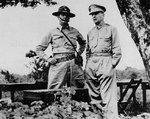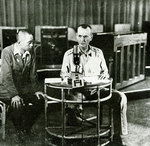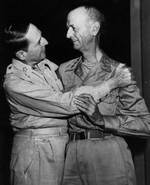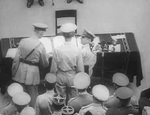Jonathan Wainwright
| Surname | Wainwright |
| Given Name | Jonathan |
| Born | 23 Aug 1883 |
| Died | 2 Sep 1953 |
| Country | United States |
| Category | Military-Ground |
| Gender | Male |
Contributor: C. Peter Chen
ww2dbaseJonathan Mayhew Wainwright IV was born at Fort Walla Walla, Washington, United States to Army officer Robert Powell Page Wainwright, a veteran of the Spanish-American War. He graduated from West Point in 1906 and served with the 1st Cavalry Brigade as a commissioned officer until 1908. He saw some combat on a tour in the Philippines before he was sent to France during WW1 in 1918. By the end of WW1 he achieved the permanent rank of Major. During the interwar years, he taught at the Cavalry School at Fort Riley and served at various cavalry units.
ww2dbaseIn Sep 1940, he was promoted to the temporary rank of Major General and sent to the Philippines under General Douglas MacArthur. When the Japanese invaded the Philippines in Dec 1941, Wainwright was MacArthur's right-hand man in executing the delay action plan to move the troops to Bataan and Corregidor. He became the Allied commander in the Philippines when MacArthur was ordered to go to Australia to assume the position of Allied Supreme Commander. "Goodbye, Jonathan," MacArthur said, in a rare fashion addressing Wainwright by his first name. "When I get back, if you're still on Bataan, I'll make you a lieutenant general." Wainwright responded, heroically and completely ignoring the promise of promotion, "I'll be on Bataan if I'm alive." After a series of valiant efforts to defend the last American holdings in the Philippines, Bataan surrendered on 9 Apr. Lacking food and ammunition, Wainwright and his troops fought on at Corregidor, not surrendering until 6 May. He became a prisoner of war in Japanese camps in Luzon, Taiwan, then Manchuria in northeastern China; he was liberated by Soviet troops on 16 Aug 1945. During his time in Manchuria, he traded everything from pens to wrist watches for information on MacArthur's advance. When he had heard that MacArthur landed on Leyte, he thought, as he later wrote, "Douglas, true to his promise to me on Corregidor... had come back... come back with a great fleet to support him and manpower beyond the dreams of defeated commanders such as ourselves." His surrender at Corregidor in 1942 haunted him through the entire time he was captured, thinking that he had failed his nation. One of his first questions upon meeting another American was "how am I thought of back in the states?"
ww2dbaseUpon release, Wainwright was flown from Mukden to Manila by means of Chongqing, China. He met with Sid Huff, who escorted him to a barber and a tailor. He had lost so much weight that his uniform was loose on his wiry frame. Wainwright then left for Japan, meeting MacArthur on MacArthur's second evening in Japan. MacArthur was not informed of Wainwright's visit, and he was ecstatic when his aide announced his visit. MacArthur recalled:
ww2dbaseWainwright, arm-in-arm with MacArthur, could only respond with "general..." before he broke down in tears. MacArthur did not notice at the time of the reunion, but afterwards he realized that the cane Wainwright walked in on that evening was a present from MacArthur before the war; he had kept it near him through the years in the prison camps. It was given by MacArthur so that his friend, a fellow general, could use it as a swagger stick, a symbol of his rank; ironically, Wainwright used it to support his weakened weight and defeated spirit.
ww2dbaseWainwright was one of MacArthur's guests of honor at the Japanese surrender aboard USS Missouri in Tokyo Bay (British general Arthur Percival was the other, also a prisoner since the start of the war). Wainwright then returned to the Philippines to receive the surrender of the local Japanese commander. He received the Medal of Honor for his valiant though failed attempt to hold the Philippines. The Medal of Honor's citation read:
ww2dbaseAfter the war, he became a four-star general and commanded the US 4th Army at Fort Sam Houston, Texas, United States. He retired from the Army in Aug 1947 and passed away in 1953. He now rests in Arlington National Cemetery, Virginia, United States.
ww2dbaseSources: American Caesar, Wikipedia.
Last Major Revision: Aug 2006
Jonathan Wainwright Interactive Map
Photographs
 |  |  |  |
Jonathan Wainwright Timeline
| 23 Aug 1883 | Jonathan Wainwright was born in Fort Walla Walla, Washington, United States. |
| 10 Mar 1942 | Jonathan Wainright's car was strafed by Japanese fighters on Bataan Peninsula, Luzon, Philippine Islands in the morning as he inspected forward areas. At noon, he traveled to Corregidor as requested by Douglas MacArthur, who informed him that President Franklin Roosevelt had ordered MacArthur to depart. |
| 12 Mar 1942 | Jonathan Wainwright took over command in the Philippine Islands. |
| 20 Mar 1942 | Jonathan Wainwright received the official US War Department order promoting him to the rank of lieutenant general and placing him charge of US troops in the Philippine Islands, replacing Douglas MacArthur, who had been ordered to go to Australia by Franklin Roosevelt. |
| 16 Aug 1945 | Jonathan Wainwright was liberated from Japanese captivity in Liaoyuan, Liaobei Province, China. |
| 25 Aug 1945 | Jonathan Wainwright arrived at Chongqing, China. |
| 30 Aug 1945 | Jonathan Wainwright arrived at Manila, Philippine Islands. |
| 2 Sep 1953 | Jonathan Wainwright passed away in San Antonio, Texas, United States. |
Did you enjoy this article or find this article helpful? If so, please consider supporting us on Patreon. Even $1 per month will go a long way! Thank you. Share this article with your friends: Stay updated with WW2DB: |
Visitor Submitted Comments
8 May 2016 06:37:31 AM
There are very few military leaders I detest as much as Dugout Doug. After the PI had finally fallen, he was quoted as deriding Wainwright for surrendering, insinuating he'd have done a better job. The man was an insufferable egomaniac with very few redeeming qualities. He and Montgomery would have loved each other.
11 May 2017 06:27:26 AM
I agree with William Taylor
21 May 2017 07:25:22 PM
William Taylor, General MacCarthur was ordered out of the Philippines By President Roosevelt and he was following orders. He was already a national hero and if he was captured or killed it would have been bad for the morale of the country. That was the thinking of senior membership including General Marshall a man that was given a bad evaluation by General MacCarthur.
MacArthur had a great many flaws, overweening vanity being first and foremost, but all the evidence indicates he was a complete stranger to physical fear and being a physical coward was literally impossible for him.
31 May 2017 12:47:04 PM
My brother jack Obrien flew Wainwright out ofmukden on Aug 2711945.he a
Has the original manifest
All visitor submitted comments are opinions of those making the submissions and do not reflect views of WW2DB.
» Invasion of the Philippine Islands
» Japan's Surrender
Related Books:
» American Caesar: Douglas MacArthur 1880-1964
- » 1,150 biographies
- » 337 events
- » 44,024 timeline entries
- » 1,242 ships
- » 350 aircraft models
- » 207 vehicle models
- » 375 weapon models
- » 123 historical documents
- » 260 facilities
- » 470 book reviews
- » 28,598 photos
- » 432 maps
Captain Henry P. Jim Crowe, Guadalcanal, 13 Jan 1943
Please consider supporting us on Patreon. Even $1 a month will go a long way. Thank you!
Or, please support us by purchasing some WW2DB merchandise at TeeSpring, Thank you!
20 Sep 2010 02:14:13 AM
Lieutenant General Jonathan Mayhew ‘Skinny’ Wainwright was a polo-playing cavalryman of the old school, who usually wore riding breeches and hat. He arrived in the Philippines in 1941 to command the Philippine scouts.
He was popular with the soldiers, for he could speak their language and understood their needs. In the final days of the long siege of Bataan, when all hope of rescue and long since passed and everybody waited for the Japanese onslaught, Wainwright spent much of his time in the front line. Later, in the siege of Corregidor, he toured the trenches and gun pits, talking with his men. In the Manchurian prison camp he was extremely badly treated by the Japanese guards which left him severely emancipated and able to walk only with the aid of a stick.
After the war, Wainwright was appointed to head the Eastern Command in the United States.